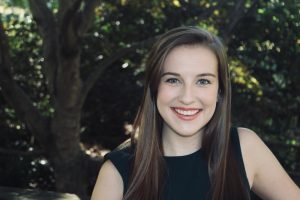 My name is Jennifer Kribbs and I am a junior from Salisbury, North Carolina. I am planning to graduate next May with a Bachelor of Arts in Psychology with a minor in Speech & Hearing Sciences. Upon graduation, I plan to attend graduate school and obtain a Master’s degree in Speech-Language Pathology.
My name is Jennifer Kribbs and I am a junior from Salisbury, North Carolina. I am planning to graduate next May with a Bachelor of Arts in Psychology with a minor in Speech & Hearing Sciences. Upon graduation, I plan to attend graduate school and obtain a Master’s degree in Speech-Language Pathology.
Last year, I served as an undergraduate research assistant at TEACCH Autism Program under the supervision of Dr. Laura Klinger. In this position, I served on a team for their T-STEP (School Transition to Employment & Postsecondary Education) Program. While a large portion of my responsibilities concerned data entry and validation, I also served as a peer mentor among adolescents with ASD for weekly T-STEP sessions at Wake Technical Community College. I have also served as a Residential Community Volunteer at the Tammy Lynn Center for Developmental Disabilities in Raleigh, where I helped care for individuals with profound intellectual and developmental disabilities. Finally, I am currently a Speech Therapy Volunteer at North Carolina Eye, Ear, Nose & Throat in Durham. In this position, I have learned how to score diagnostic assessments, created minimal pair word-picture lists to be used in therapy, and observed speech therapy sessions among clients with ASD, apraxia, articulation disorders, and language delays. These experiences and the courses I have taken through the Psychology Department and the Division of Speech and Hearing Sciences have really peaked my interest in the interrelated nature of psychology and speech-language pathology. I have been exposed to various communication disorders and have been able to determine which I am most interested in: aphasia, autism, and dementia. Additionally, I have not only learned about the various disorders and their typical symptomatology, exhibited behaviors, and cognitive deficits, but also about how to effectively apply skills and knowledge to treat the individual.
This semester, I have the privilege to serve as a Karen M. Gil Intern at the Center for Aphasia and Related Disorders (CARD) within the School of Medicine under the mentorship of Dr. Katarina Haley, Ph.D, CCC-SLP, who is a professor in the Division of Speech and Hearing Sciences and one of the directors of CARD. The mission of CARD is to maximize functional communication in adults with neurologic communication disorders. Thus far, I have been involved in two projects. First, I have been charged with the task of entering data from speech assessments among individuals with left-hemisphere strokes. With this data, I have been able to calculate phonological inventory and word complexity scores. Secondly, I have begun the process of transcribing video samples of story-telling from a diverse population of stroke survivors. In this study, the researchers at CARD are interested to see the benefits of transcranial direct current stimulation (tDCS) and computerized naming treatment to accelerate stroke rehabilitation. Both of these tasks will provide information that will generate new knowledge to inform the future practice and treatment among adults with neurologic communication disorders.
It is because of the Gil Internship that I have been able to gain professional skills, further develop meaningful relationships with my professors, and acquire research experience in a field that I typically would not have had the opportunity to do until graduate school. I would like to thank the Gil Internship Program, Dr. Buzinski and Chelsea, UNC CARD, and Dr. Haley for giving me this wonderful opportunity. I am confident that the skills and experience I gain during this internship will be invaluable in my future career.
